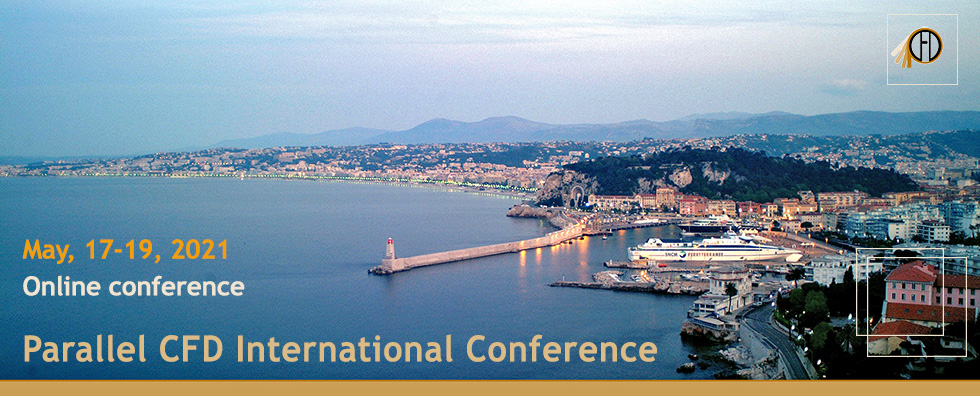
|
|
|
MinisymposiaMS1- Applying Artificial Intelligence in CFD WorkflowsOrganizers: Rooh Khurram and Hong Im (KAUST, KSA) The convergence of scientific computing and data driven science opens up new opportunities for the scientific community. Deep learning based training has been applied successfully in the fields of computer vision, robotics, gaming, and medical science, but there are limited examples of applying it to CFD workflows. The main objective of organizing this mini-symposium is to report on some of the initial success stories and challenges that the CFD community is facing in applying Artificial Intelligence (AI) techniques to their CFD workflows. This mini-symposium seeks contributions in the areas including but not limited to: •Applications of deep learning/machine learning in CFD •Fundamental contributions in the area of deep learning •Scalable deep learning on supercomputers •Performance of AI benchmarks on x86 CPUs, GPUs, and ARM Processors •Convergence of data driven science and high-performance computing MS2- Challenges for CFD in aeronautics industryOrganizers: Vincent Couaillier (ONERA, France) Safer and cheaper aircrafts require new concepts and increasingly complex physical and numerical modeling, integrating the multi-physics interactions of aerodynamics, with acoustics, propulsion, structures and materials. In this framework the development of new and increasingly powerful CFD simulation tools over the years has allowed manufacturers in the aerospace industry to progress through the design life cycle in a more timely and cost-effective manner by supplementing or replacing experimental testing with CFD computations. Today, the demand for very accurate CFD predictions at an ever-increasing level of detail is the driving force for the development of highly accurate simulation techniques able to predict not only overall flow features, but also local values of the quantities of interest, validated by experiments at all scales, relying on very high performance computing capabilities. This mini-symposium is dedicated to contributions addressing the state-of-the-art of industrial CFD, in particular though the following points: •Adaptive high order methods for complex flow physics simulation •Error estimation with local and global adaptation techniques •Hybridization of CFD & data models for advanced flow physics simulation •New software generation for RANS/URANS simulations on advanced HPC architecture •Scale resolved methods for advanced configurations •Alternative approaches in CFD MS3- HPC-enabling technologies for combustion applicationsOrganizers: Daniel Mira Martinez , Ricard Borrell (BSC, Spain), Jian Fang, Charles Moulinec, David R. Emerson (STFC, UK) The rapid growth in HPC in the past three decades has boosted large-scale high-fidelity simulations of combustion and turbulent reacting flows. However, the complexity of turbulence/chemistry interaction and the variety of flow scales in combustion raises a lot of challenges in parallelisation, algorithm and numerical scheme developments, turbulence and combustion modelling.
Topics of interest of this mini-symposium include, but are not limited to: - High-performance computing of combustion applications - Combustion simulation on hybrid architectures - Numerical schemes, models and algorithms, e.g. adaptive mesh refinement - Software engineering for combustion applications, including code coupling - Specific phenomena in combustion, e.g. droplets, detonation, explosions, ignition, quenching, flame-wall interaction MS4- Geophysical image estimation by inversionOrganizers: Antoine Guitton (Total S.A., France), Matteo Ravasi (KAUST, KSA) Jon Claerbout, the founder of the Stanford Exploration Project and father of many breakthroughs in seismic imaging and inversion, often narrates this story that took place in the 80’s: as he was invited to give a presentation at one of the biggest oil and gas seismic contractor, he suggested to give a talk about inversion and its potential benefits for seismic processing. To his astonishment, he received a resounding push back from one of the (famous) senior geophysicists who claimed that no one in his right mind would be interested in hearing about inversion and that he should stick to more conventional approaches in his presentation. Fortunately for us, much has changed, and inversion is at the core of most (if not all) of the recent technological advancements of the past decade in geophysical data processing. In fact, all the conventional approaches that this skeptical geophysicist was so eager to listen to are adjoints of forward linear operators that can be used in an inversion framework! In a quest to use more and more information from geophysical data to better characterize subsurface properties, geophysicists are pushing the frontiers of inversion in terms of volume of data processed (100’s of Terabytes), of the complexity of the physical processes considered (full modeling of elastic effects and inclusion of all wave phenomena, such as multiples) and of the diversity of the data inverted for (e.g. from gravity, controlled source electromagnetic, or magnetotelluric.) These ambitious goals require inversion engines that can scale to thousands of nodes in a robust manner to deliver usable results on time. This mini symposium seeks contributions illustrating the state-of-the-art in inversion applied to geophysical data. In particular, the following topics would be of particular interest:
These themes illustrate the challenges posed by geophysical data in current oil and gas exploration/production environments (but not limited to) and how geophysicist tackle them. MS5- Parallel AlgorithmsOrganizers: Guillaume Houzeaux and Ricard Borrell (Barcelona Supercomputing Center, Spain) Parallelisation has traditionally been associated to algebraic solvers, mainly in the context of domain decomposition methods and have focused the attention of theoretical and applied researchers in conferences and journals. However, in comparison, very few papers describing parallelisation or optimisation techniques have been published in the literature concerning the different algorithms and tasks composing a CFD code.
|

